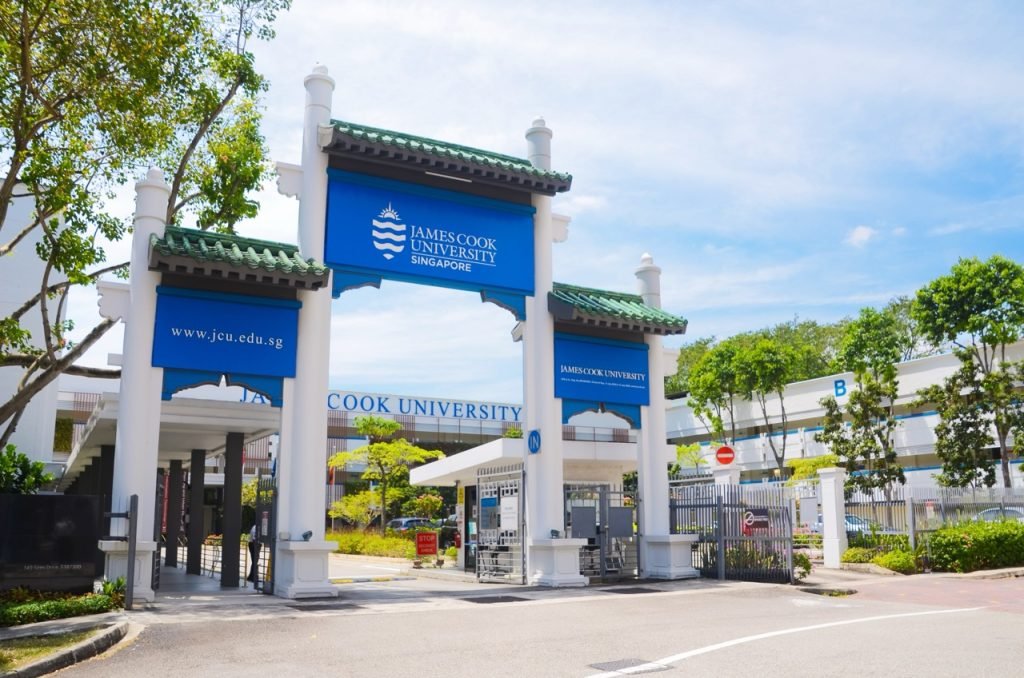Studying abroad in Singapore is an incredible opportunity. You’ll experience a vibrant mix of cultures, meet students from around the globe, and develop valuable knowledge and skills for your future. James Cook University Singapore – the international branch of James Cook University in Australia – is one of our exciting destinations for studying abroad for one or two semesters, or even a whole degree.
Singapore is known for its modern skyline, excellent public transport, lush green spaces, and dynamic economy. It’s a safe, clean and multicultural city, making it one of Asia’s top education hubs. With its world-class infrastructure and endless opportunities, Singapore has become a popular choice for international students seeking quality education in a global city. But before you book your flight, it’s important to understand the costs involved in living and studying in Singapore.
In this blog post, we’ll break down all the major expenses you can expect during your time in Singapore – from tuition fees to daily living costs – to help you plan your budget and get the most out of your experience in this exciting destination.

1. Tuition Fees: The Big One
When planning to study abroad, tuition fees are often the biggest part of your budget. At James Cook University Singapore, the cost reflects the high-quality education you’ll receive – the same Australian-standard curriculum delivered in a vibrant, global city.
- Semester Abroad: starting from S$10,791 (~7,200€)
- Bachelor’s Degree: between S$62,130 – S$67,362, depending on the program (~41,600€ – 45,100€)
- Master’s Degree: from S$41,529 up to S$71,667, varies by specialization (~27,800€ – 48,000€)
It might seem like a significant investment but remember that you’re getting world-class Australian education combined with the unique experience of living in one of Asia’s most dynamic cities.
For additional financial support, be sure to check out any scholarships or financial aid options, offered for example by your home university or your home country. Find more information about where to find scholarships and how to apply for them from our website: https://asiaexchange.org/studying-in-asia/funding/scholarships/
2. Accommodation: Where Will You Live?
James Cook University Singapore does not offer on-campus housing – but don’t worry! The university has partnered with several off-campus co-living providers to help students find safe, well-managed accommodation near campus. Here’s a look at the key options and what they typically cost per month:
HomeyDays
Based on listing like Canne Ville and Kovan Residences, HomeyDays rooms (single master ensuite or common bedroom) generally start at about S$2,300 (~1,540€) per month per bed.
Cove Living (including variants like Cozy Living, CozyHouz, De Cozy)
Cove manages several stylish student-housing properties such as The Centren, Cassia View, and Park 1 Suites. Rooms typically range between S$2,300 and S$2,600 (~1,540€ – 1,740€) per month per bed, all in ensuite rooms, with utilities, Wi-Fi, furnishings, and community perks included.
Coliwoo
Coliwoo-managed units, like the one at 320 Balestier, offer small queen rooms with private bathrooms. These run at around S$2,400 (~1,600€) per month per bed.
Booking Tips & What’s Typically Included
Most co-living providers recommended by James Cook University Singapore include essential amenities in the rent. This typically covers furnishing, utilities, Wi-Fi, and weekly cleaning services, making your stay comfortable and hassle-free. Providers like Cove and HomeyDays are known for offering fully equipped rooms, so you don’t have to worry about buying extra furniture or setting up internet connections.
When it comes to lease terms, expect a minimum commitment of around three months. Many providers allow early check-ins and require a refundable deposit, usually equivalent to one month’s rent. This flexibility makes it easier for international students to transition smoothly when moving to Singapore.
Location matters too. Most accommodation options recommended by JCU are located in areas like Geyland, Balestier, Kallang, or Cassia View, which are all within a 10–15-minute walk or short bus ride to campus. This means you can save time on commuting while enjoying vibrant neighborhoods with easy access to food, transport, and other amenities.
If you’re on a tighter budget, note that shared HDB rooms or more basic housing options can sometimes be found for S$800–1,500 (~540€ – 1,000€) per month. However, official JCU-approved housing typically starts at around S$2,300 (~1,540€) per month for individual ensuite rooms. While this may seem costly, these options provide peace of mind through security, quality assurance, and convenience.
Why This Suits JCU Students
All the recommended providers are official partners of JCU, meaning they meet the university’s standards for safety, contract quality, and amenities. This gives students confidence that their accommodation is both reliable and student-friendly.
These co-living spaces are ideal for short-term or exchange students as they offer safe, fully furnished environments with a sense of community. Many providers also offer flexible rental periods, move-in-ready rooms, and opportunities to meet other international students, which can make adjusting to life in Singapore much easier.

3. Living Expenses: Everyday Costs in Singapore
At first glance, Singapore may seem expensive, but with smart budgeting, you can enjoy this vibrant city without breaking the bank. Here’s what you need to know about day-to-day costs as an international student.
Food and Groceries
Singapore is a food lover’s paradise! If you enjoy eating out, you’ll love the hawker centres, where you can grab a hearty meal for as little as S$4 to S$8 (~2.70€ – 5.35€). If you prefer mid-range restaurants, expect to pay around S$15 to S$30 (~10€ – 20€) per meal. Fast-food options like McDonald’s or Subway typically cost S$8 to S$12 (~5.35€ – 8€).
Cooking at home can help you save even more. A monthly grocery bill for one person usually ranges from S$200 to S$400 (~135€ – 270€), depending on your diet and lifestyle. Popular supermarkets include FairPrice, Cold Storage, and Sheng Siong, and you can find fresh produce at local wet markets too.

Transportation
Getting around Singapore is easy and affordable thanks to the efficient MRT (Mass Rapid Transit) and bus system. A monthly public transport pass costs about S$128 (~85€), which covers unlimited travel on buses and trains – perfect for students who move around the city frequently.
Taxis and ride-hailing services like Grab are widely available but costlier. A short ride of about 10 minutes can range from S$8 to S$15 (~5.35€ – 10€), depending on time and demand.
Utilities and Internet
If you book one of JCU’s recommended co-living providers, utilities and Wi-Fi are usually included in your rent – a big bonus for students. However, if you rent a private apartment, you’ll need to budget for these additional costs. Electricity, water, and gas typically range from S$100 to S$200 (~70€ – 135€) per month for a single person in a shared flat, while high-speed internet costs around S$40 to S$60 (~27€ – 40€) per month, depending on the provider and package you choose.
4. Entertainment and Leisure: Enjoying Singapore Without Breaking the Bank
Singapore has a reputation for being modern and vibrant, but you don’t need to spend a fortune to have fun here. While the city boasts world-class attractions, fine dining, and luxury shopping on Orchard Road, there are plenty of affordable ways to enjoy your free time.
Take a stroll through the city’s beautiful gardens and parks, such as the Singapore Botanic Gardens (a UNESCO World Heritage site) or the futuristic Gardens by the Bay, where some areas are free to enter. You can also explore lively hawker centres, cultural neighborhoods like Chinatown, Little India, and Kampong Glam, or enjoy stunning city views from places like Marina Barrage – all without spending much.
If you’re into entertainment, movie tickets cost around S$10 to S$14 (~7€ – 9€), while entry fees to museums and galleries usually range between S$10 and S$20 (~7€ – 13€). Even on a student budget, Singapore offers countless opportunities for fun, food, and culture without breaking the bank.

5. Other Miscellaneous Costs
When planning your budget for studying in Singapore, remember to account for everyday extras like clothing, mobile phone plans, and study materials. Clothing prices in Singapore are generally comparable to those in Western countries, with plenty of affordable options at local malls and street markets. You can also score great deals during seasonal sales at shopping hubs like Bugis Street, Orchard Road, or ViVoCity.
For your mobile phone, most students choose a prepaid SIM card, which typically costs S$20 to S$50 (~13€ – 33€) per month, depending on your data and call needs. Popular Providers include Singtel, StarHub, and M1, all of which offer student-friendly plans.
Conclusion: Plan Smart, Enjoy More
Studying abroad in Singapore at James Cook University is an incredible experience, offering top-quality Australian education in one of Asia’s most exciting cities. While the cost of living can seem high at first glance, careful planning can help you stay within budget and still enjoy everything Singapore has to offer.
Here’s a rough estimate of average monthly expenses for a student in Singapore:
- Accommodation: S$2,300+ (official co-living providers) or S$800–1,500 for budget options
- Food & groceries: S$400–600
- Transportation: S$128 for a monthly public transport pass
- Miscellaneous (phone, entertainment, personal): S$100–200
This means you should budget around S$3,000–3,300 (~2,000€ – 2,200€) per month if you choose JCU’s recommended housing options, or as low as S$1,500–1,900 (~1000€ – 1270€) of you go for more budget-friendly accommodation.
By planning your expenses wisely, you can make the most of your time in Singapore without breaking the bank. Enjoy world-class education, explore the city’s cultural gems, and create unforgettable memories.

Apply Now
Did you get hyped for your own study abroad adventure in Singapore? This is your chance – apply now to study in Singapore in 2025 or 2026! Here is an overview of all upcoming application deadlines:
Semester abroad at JCU:
September 2025 – December 2025: 18.08.2025
January 2026 – April 2026: 22.12.2025
May 2026 – August 2026: 20.04.2026
Full degree at JCU (both bachelor’s and master’s):
Starting in September 2025: 18.08.2025
Starting in January 2026: 22.12.2025
Starting in May 2026: 20.04.2026
Need more information? Got questions?
Book a free online counselling session here!
The post Breaking Down the Costs – What to Expect When Studying in Singapore appeared first on Asia Exchange.
Article source: https://asiaexchange.org/blogs/costs-when-studying-in-singapore/

